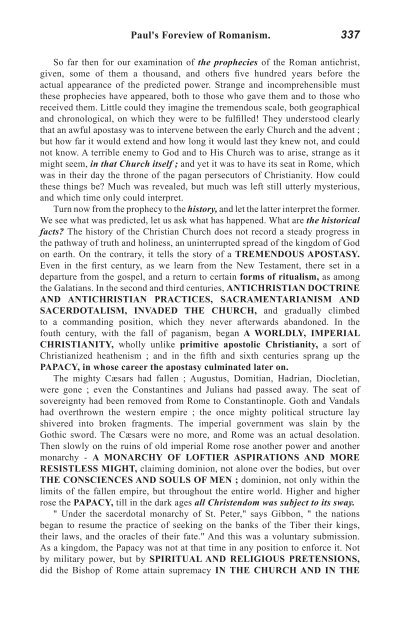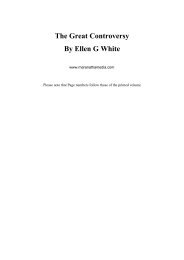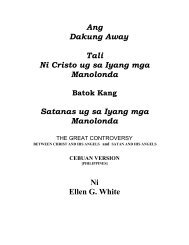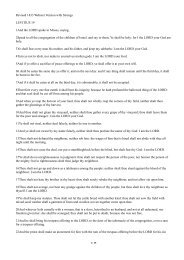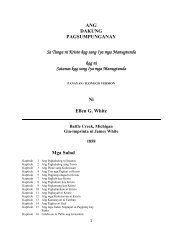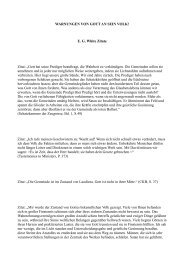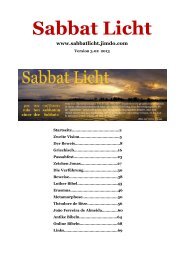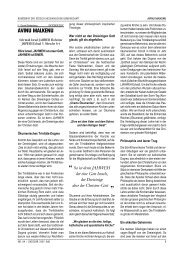- Page 4 and 5:
Die Heiligen Zehn Gebote JAHWEH's,
- Page 8 and 9:
7th version
- Page 10 and 11:
iiThe preface of the Darby (Elberfe
- Page 12 and 13:
ivEdition, the Hebrew Bibles, the G
- Page 14:
viSince the first century many peop
- Page 17 and 18:
ixAlso may God bless those who have
- Page 19:
xiIsaiah 43,1b KJV + EL = FEAR NOT:
- Page 24 and 25:
xvi
- Page 26:
xviii................200...........
- Page 30 and 31:
xxii. . . . . . . . . . . . . . . .
- Page 32:
xxiv...............................
- Page 40:
2Daniel 1Dan 1,7 Und der oberste K
- Page 44 and 45:
6Daniel 2Dan 2,21 Er ändert Zeit u
- Page 46 and 47:
8Daniel 2des Himmels Königreich, M
- Page 48 and 49:
10Daniel 2SHALL NEVER BE DESTROYED,
- Page 50 and 51:
12Daniel 3THE DEDICATION OF THE IMA
- Page 52 and 53:
14Daniel 3KJV + EL = BUT IF NOT, BE
- Page 54 and 55:
16Daniel 3. 4NATIONS, AND LANGUAGES
- Page 56 and 57:
18Daniel 4THE MOST HIGH RULES IN TH
- Page 59 and 60:
Daniel 4. 521WAHRHEIT, UND SEIN WAL
- Page 61 and 62:
Daniel 523Verstand und Klugheit, Tr
- Page 64 and 65:
26Daniel 6THEY COULD FIND NONE OCCA
- Page 66 and 67:
28Daniel 6TO HIS PALACE, AND PASSED
- Page 68 and 69:
30Daniel 7Entstehung von Reichen f
- Page 70 and 71:
32Daniel 7“ein Mund, vermessen re
- Page 73:
Daniel 735ALL THE KINGDOMS, AND SHA
- Page 76 and 77:
38Daniel 7. 8THOUGHTS MUCH TROUBLED
- Page 78 and 79:
40Daniel 8TRETUNG DAHINGEGEBEN IST?
- Page 80 and 81:
42Daniel 8Dan 8,25 Und durch seine
- Page 82 and 83:
44Daniel 9PRINCES, AND OUR FATHERS,
- Page 84 and 85:
46Daniel 9Die siebzig WochenDan 9,2
- Page 86 and 87:
48Daniel 9Jahrwochen Weissagungszei
- Page 88 and 89:
50Daniel 10die Nachfolger Christi v
- Page 90 and 91:
52Daniel 10ALONE, AND SAW THIS GREA
- Page 92 and 93:
54Daniel 11wird den größern Reich
- Page 94 and 95:
56Daniel 11Dan 11,10 Aber seine Sö
- Page 97 and 98:
Daniel 1159war. (= Jahschuas Kreuzi
- Page 99:
Daniel 1161aber es wird ihm zum and
- Page 102 and 103:
64Daniel 11für Menschen öffnen un
- Page 104 and 105:
66Daniel 11Die Weissagung in Vers 4
- Page 107 and 108:
Daniel 1269Entdeckungen in der Endz
- Page 109:
Daniel 1271Rom und dem Anfang der p
- Page 114 and 115:
76Offenbarung ~ Revelation 1und von
- Page 116 and 117:
78Offenbarung ~ Revelation 1voice t
- Page 118 and 119:
80Offenbarung ~ Revelation 2LIARS (
- Page 120 and 121:
82Offenbarung ~ Revelation 2Juden,
- Page 122 and 123:
84Offenbarung ~ Revelation 2das Sch
- Page 124 and 125:
86Offenbarung ~ Revelation 2Gefalle
- Page 126 and 127:
88Offenbarung ~ Revelation 3(vollko
- Page 128 and 129:
90Offenbarung ~ Revelation 3AND ARE
- Page 130 and 131:
92Offenbarung ~ Revelation 3und sal
- Page 132 and 133:
94Offenbarung ~ Revelation 4Offb 4,
- Page 134 and 135:
96Offenbarung ~ Revelation 5Kapitel
- Page 136 and 137:
98Offenbarung ~ Revelation 5. 6aus
- Page 138 and 139:
100Offenbarung ~ Revelation 6Lebens
- Page 140 and 141:
102Offenbarung ~ Revelation 6KJV +
- Page 142 and 143:
104Offenbarung ~ Revelation 7Offb 7
- Page 144 and 145:
106Offenbarung ~ Revelation 7. 8Off
- Page 146 and 147:
108Offenbarung ~ Revelation 8Nieder
- Page 148 and 149:
110Offenbarung ~ Revelation 8Schwar
- Page 150 and 151:
112Offenbarung ~ Revelation 9Antlit
- Page 152 and 153:
114Offenbarung ~ Revelation 9Mohamm
- Page 154 and 155:
116Offenbarung ~ Revelation 9REPENT
- Page 157 and 158:
Offenbarung ~ Revelation 10. 11119i
- Page 159 and 160:
Offenbarung ~ Revelation 11121Erkl
- Page 161 and 162:
Offenbarung ~ Revelation 11. 12123K
- Page 163 and 164:
Offenbarung ~ Revelation 12125and t
- Page 165 and 166:
Offenbarung ~ Revelation 12. 13127W
- Page 167 and 168:
Offenbarung ~ Revelation 13129gehen
- Page 169:
Offenbarung ~ Revelation 13131Kap 1
- Page 172 and 173:
134Offenbarung ~ Revelation 14KJV +
- Page 174 and 175:
136Offenbarung ~ Revelation 14A = F
- Page 176 and 177:
138Offenbarung ~ Revelation 14Addit
- Page 178 and 179:
140Offenbarung ~ Revelation 14Offb
- Page 180 and 181:
142Offenbarung ~ Revelation 14. 15r
- Page 182 and 183:
144Offenbarung ~ Revelation 16Offb
- Page 184 and 185:
146Offenbarung ~ Revelation 16DRAGO
- Page 186 and 187:
148Offenbarung ~ Revelation 16. 17N
- Page 188 and 189:
150Offenbarung ~ Revelation 17auch
- Page 190 and 191:
152Offenbarung ~ Revelation 17Erkl
- Page 192 and 193:
154Offenbarung ~ Revelation 18WITH
- Page 194 and 195:
156Offenbarung ~ Revelation 18STONE
- Page 197 and 198:
Offenbarung ~ Revelation 19159auf d
- Page 199 and 200:
Offenbarung ~ Revelation 19161Offb
- Page 201 and 202:
Offenbarung ~ Revelation 20163not p
- Page 203 and 204:
Offenbarung ~ Revelation 20. 21165d
- Page 205 and 206:
Offenbarung ~ Revelation 21167YOU T
- Page 208 and 209:
170Offenbarung ~ Revelation 22Offb
- Page 211:
Offenbarung ~ Revelation 22173The v
- Page 215 and 216:
Official Statements - Trinity177are
- Page 217 and 218:
Official Statements - Trinity179Jes
- Page 219 and 220:
Official Statements - Trinity181Und
- Page 221 and 222:
Official Statements - Trinity183Quo
- Page 223 and 224:
Official Statements - Trinity185Ple
- Page 225 and 226:
Official Statements - Trinity187by
- Page 227 and 228:
Official Statements - Trinity189Bro
- Page 229 and 230:
Official Statements - Trinity191chu
- Page 231 and 232:
Official Statements - Trinity193In
- Page 233 and 234:
Official Statements - Trinity195“
- Page 235:
Official Statements - Trinity197rea
- Page 239 and 240:
The Truth about the Trinity201The N
- Page 241 and 242:
The Truth about the Trinity203estab
- Page 243 and 244:
The Truth about the Trinity205“Pr
- Page 245 and 246:
The Truth about the Trinity207the B
- Page 247 and 248:
The Truth about the Trinity209from
- Page 249 and 250:
211Three famous martyrs of EnglandT
- Page 251 and 252:
Dr. Martin Luther and the Reformers
- Page 253 and 254:
Dr. Martin Luther and the Reformers
- Page 255 and 256:
Dr. Martin Luther and the Reformers
- Page 257 and 258:
Dr. Martin Luther and the Reformers
- Page 259 and 260:
Dr. Martin Luther and the Reformers
- Page 261 and 262:
Dr. Martin Luther and the Reformers
- Page 263 and 264:
Dr. Martin Luther and the Reformers
- Page 265 and 266:
Dr. Martin Luther and the Reformers
- Page 268 and 269:
230Official Statements of the Clerg
- Page 270 and 271:
232 Official Statements of the Cler
- Page 272 and 273:
234Official Statements of the Clerg
- Page 274 and 275:
236Official Statements of the Clerg
- Page 276 and 277:
238Falsification of the Resurrectio
- Page 278 and 279:
240Falsification of the Resurrectio
- Page 280 and 281:
242Falsification of the Resurrectio
- Page 282 and 283:
244Falsification of the Resurrectio
- Page 284 and 285:
246 Falsification of the Resurrecti
- Page 286 and 287:
248 Falsification of the Resurrecti
- Page 288 and 289:
250How The Savior‘s Name Was Chan
- Page 290 and 291:
252How The Savior's Name Was Change
- Page 292:
254How The Savior's Name Was Change
- Page 295 and 296:
Is His Name Jehovah or Yahweh?257Th
- Page 297 and 298:
Is His Name Jehovah or Yahweh?259na
- Page 300 and 301:
262The Plan of Salvation of YAHWEH,
- Page 303 and 304:
The Plan of Salvation of YAHWEH265W
- Page 305 and 306:
The Plan of Salvation of YAHWEH267S
- Page 307 and 308:
The Plan of Salvation of YAHWEH269B
- Page 309 and 310:
The Plan of Salvation of YAHWEH271A
- Page 311 and 312:
The Plan of Salvation of YAHWEH273L
- Page 313 and 314:
The Plan of Salvation of YAHWEH275b
- Page 315 and 316:
The Plan of Salvation of YAHWEH277A
- Page 317 and 318:
The Plan of Salvation of YAHWEH279R
- Page 319 and 320:
THE PRESENT TRUTH - April, 1850.281
- Page 321 and 322:
THE PRESENT TRUTH - April, 1850.283
- Page 323 and 324: THE PRESENT TRUTH - April, 1850.285
- Page 325 and 326: THE PRESENT TRUTH - April, 1850.287
- Page 327 and 328: THE PRESENT TRUTH - April, 1850.289
- Page 329 and 330: THE PRESENT TRUTH - April, 1850.291
- Page 331 and 332: THE PRESENT TRUTH - April, 1850.293
- Page 333 and 334: THE PRESENT TRUTH - April, 1850.295
- Page 335 and 336: THE PRESENT TRUTH - July, 1849.297T
- Page 337 and 338: THE PRESENT TRUTH - July, 1849.299T
- Page 339 and 340: THE PRESENT TRUTH - July, 1849.301s
- Page 341 and 342: THE PRESENT TRUTH - July, 1849.303h
- Page 343 and 344: THE PRESENT TRUTH - July, 1849.305W
- Page 345 and 346: THE PRESENT TRUTH - July, 1849.307i
- Page 348 and 349: 310THE ADVENT REVIEWVol. 1 Paris, M
- Page 350 and 351: 312THE ADVENT REVIEW - November, 18
- Page 352 and 353: 314THE ADVENT REVIEW - November, 18
- Page 354 and 355: 316THE ADVENT REVIEW - November, 18
- Page 356 and 357: 318THE ADVENT REVIEW - November, 18
- Page 358 and 359: 320INTERPRETATION AND USE OF THESEP
- Page 360 and 361: 322Pre-Reformation Interpreters.of
- Page 362 and 363: 324Pre-Reformation Interpreters.Scr
- Page 364 and 365: 326Pre-Reformation Interpreters.Ber
- Page 366 and 367: 328Pre-Reformation Interpreters.In
- Page 368 and 369: 330Pre-Reformation Interpreters.Who
- Page 370 and 371: 332Pre-Reformation Interpreters.The
- Page 372: 334 Pre-Reformation Interpreters.
- Page 378 and 379: 340Paul's Foreview of Romanism.not
- Page 380 and 381: 342Paul's Foreview of Romanism."...
- Page 382 and 383: 344Paul's Foreview of Romanism.conf
- Page 384 and 385: 346Paul's Foreview of Romanism.be h
- Page 386 and 387: 348 Paul's Foreview of Romanism.Pet
- Page 388: 350Paul's Foreview of Romanism.unri
- Page 391 and 392: John's Foreview of Romanism.353The
- Page 393 and 394: John's Foreview of Romanism.355woun
- Page 395 and 396: John's Foreview of Romanism.357then
- Page 397 and 398: John's Foreview of Romanism.359born
- Page 399 and 400: John's Foreview of Romanism.361that
- Page 401 and 402: John's Foreview of Romanism.363empt
- Page 403 and 404: John's Foreview of Romanism.365depe
- Page 405 and 406: John's Foreview of Romanism.367Quot
- Page 407 and 408: John's Foreview of Romanism.369Sund
- Page 409 and 410: Interpretation of the Reformers.371
- Page 411 and 412: Interpretation of the Reformers.373
- Page 413 and 414: Interpretation of the Reformers.375
- Page 415 and 416: Interpretation of the Reformers.377
- Page 417 and 418: Interpretation of the Reformers.379
- Page 419 and 420: Interpretation of the Reformers.381
- Page 421 and 422: Interpretation of the Reformers.383
- Page 424 and 425:
386THE TWO BIBLES.In the authority
- Page 426 and 427:
388THE TWO BIBLES.did not end there
- Page 428:
390 THE TWO BIBLES.With history's p
- Page 431 and 432:
Interpretation in post-Reformation
- Page 433 and 434:
Interpretation in post-Reformation
- Page 435 and 436:
Interpretation in post-Reformation
- Page 437 and 438:
Interpretation in post-Reformation
- Page 439 and 440:
Interpretation in post-Reformation
- Page 441 and 442:
Interpretation in post-Reformation
- Page 443 and 444:
Double foreview of the Reformation.
- Page 445 and 446:
Double Foreview of the Reformation.
- Page 447 and 448:
Double Foreview of the Reformation.
- Page 449 and 450:
Double Foreview of the Reformation.
- Page 451 and 452:
Double Foreview of the Reformation.
- Page 453 and 454:
Double Foreview of the Reformation.
- Page 455 and 456:
Double Foreview of the Reformation.
- Page 457 and 458:
Double Foreview of the Reformation.
- Page 459 and 460:
Double Foreview of the Reformation.
- Page 461 and 462:
Double Foreview of the Reformation.
- Page 463 and 464:
Double Foreview of the Reformation.
- Page 465 and 466:
Double Foreview of the Reformation.
- Page 468 and 469:
430CONCLUDING REMARKS.WE trust that
- Page 470 and 471:
432Concluding Remarks.remarkable, a
- Page 472 and 473:
434 Concluding Remarks.true peace n
- Page 474:
436Concluding Remarks.conspiracy ex
- Page 477 and 478:
Spiritualism439Ellen G. White write
- Page 479 and 480:
Spiritualism441DIE, WE WILL STAY AL
- Page 481 and 482:
Spiritualism4432. Corinthians 11:13
- Page 484 and 485:
446How far is it actually from the
- Page 487 and 488:
449APPEAL OF THE KING OF BABYLON ca
- Page 489:
APPEAL OF THE KING OF BABYLON451AND
- Page 493 and 494:
Remember „one Mediator.“455Reme
- Page 495 and 496:
HIM SHALL YOU HEAR!45724 When there
- Page 497 and 498:
HIM SHALL YOU HEAR!459Rom 10:4 KJV
- Page 499 and 500:
Revelation of Yahshua the Messiah46
- Page 501 and 502:
Revelation of Yahshua the Messiah46
- Page 503 and 504:
Revelation of Yahshua the Messiah46


